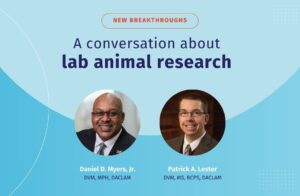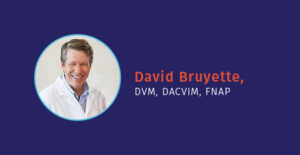After a two-year break due to the COVID pandemic, the ACVO/Epicur National Service Animal Eye Exam Event is back this May! As the namesake sponsor of the event, this is one of the Epicur team’s favorite events. It truly shows the compassion and heart of the veterinary community with veterinary ophthalmologists and their staff volunteering their time the entire month to give free eye exams to service animals. We’ve had the privilege of being at some of the clinics during these exams to see firsthand how much this event means to the pet, the owner, and the veterinary clinics.
Dr. Christine Lim, DVM, DACVO is an ophthalmologist at Eye Care for Animals and has volunteered for the ACVO/Epicur event for years. We recently sat down with her to learn more about why she chose veterinary ophthalmology and what this philanthropic event means to her.
Thanks for sharing your perspective on the event with us, Dr. Lim! Can you tell us more about your background and how you ended up in the veterinary field?
Like most kids, I loved animals. I did pet sitting and worked at various clinics and the Humane Society when I was younger. That led me to veterinary medicine. During school I developed an interest in ophthalmology, probably because it was both surgery and medicine rather than just one or the other, I got to do both.
After vet school in Ontario, I did a one-year internship in small animal medicine and surgery. Then I did one year in small animal general practice where I also spent time with an ophthalmologist on my days off to see how an ophthalmology practice worked. Following that, I went to UC Davis for a three-year residency in ophthalmology.
My first job as an ophthalmologist was in Saskatchewan at the university for a couple of years before joining the faculty in Minnesota for about seven years. Then we moved to Chicago, which is when I joined Eye Care for Animals.
What is it that’s so special about the ophthalmology specialty to you?
I think Ophthalmology is very cool because you can take someone who is blind and scared and give them their vision back; you’re helping them enjoy life again. Even in the sad cases where they’re permanently blind and they’re in pain, you can at least take away the pain and make them feel better.
I think the surgeries are very cool and a nice challenge. A lot of them are quite intricate and artistic, which makes them interesting. But it’s also a mix of surgery and medicine. So, I think it’s just a nice specialty because you get to do a lot of different things with different species. We do eyes so it doesn’t matter what animal you’re working with; you get a lot of variety.
Help your pet owners stay up to date with their pet’s eye health!
Check out our animal eye health page, which includes our new handout—Eyes on Health!

Do you specialize in a particular surgery or area of ophthalmology?
Veterinary ophthalmology specialties are less developed than they are in human physician medicine where you have retinal specialists, corneal specialists, etc. There are several veterinary retinal specialists in North America.
Personally, I like all ophthalmology surgeries because I like the mix, but I do enjoy intraocular surgery a little more than the others. It’s very intricate and more of a challenge. The area you’re working on is very small and all right in front of you. It was very hard for me as a general practitioner to enjoy things like abdominal surgery because it was less intricate and clean.
Ophthalmology definitely sounds like an interesting area of veterinary medicine! Let’s talk about the ACVO/Epicur National Service Animal Eye Exam Event – how long have you been participating?
For more than a decade – I’ve been volunteering since I started as an ophthalmologist in 2008. The clinic I was practicing in at the time would sign up, so that’s how I got into it.
There was a lot of promotion around it and it’s a fun event to do. I think everyone in ophthalmology is interested and willing to do it.
And your clinic does the exams for the police dogs, correct? How did you get connected with such an important group of service dogs?
Most practices I’ve worked at have police dogs as patients. For Chicago that was the case before I joined the practice. Working with them for the service animal event grew out of those connections.
For the event this year, one of my vet techs and I are going to drive down to the department’s canine training facility to do a bunch of exams back-to-back to make things easier for them this year.


Roy, a Chicago Police K-9, with Dr. Lim after completing his exam this year!
Are there any unique stories that you have from the event? Or a favorite animal that you’ve examined?
I think a lot of times it’s not just about the pet or the animal that you’re seeing. It’s just the whole relationship with the owner and how special their service animal is to them. It’s really nice to see the bond between the person and the service animal, a dog in most of these cases, and how much these dogs help these people in life.
Have any of the exams ever resulted in a big medical catch or impact on the service animal?
We did have one police dog, not in Chicago but somewhere else, and it turned out he was nearly blind from hereditary retinal degeneration. The police department and handler didn’t know that. Unfortunately, there was no way to save his sight or change the outcome but knowing that information is important because it impacts the dog’s ability to do its job.
Besides dogs, what other types of animals have you seen?
For the event, it’s mostly dogs. There are many service animals that aren’t dogs, but that’s the most common one I see during May exams.
Outside of the event, I think any of the zoo animals must be the most interesting. There was a Galapagos tortoise that was really happy to see me the first time but on the second visit she remembered why I was there, so she pulled her head in as soon as I walked into her area.
It’s been years, but I did cataract surgery on a bald eagle once. I used to see a lot of raptors when I was on faculty in Minnesota. Weekly we did eye exams at their raptor center where they treated injured raptors. That was a lot of fun. During zoo visits, I’ve had the opportunity to examine a whole bunch of different species.
That sounds like it makes for interesting workdays! Before we wrap up, what would you say the ACVO/Epicur Service Animal Eye Exam Event means to you and the impact that it has?
I think it’s just nice to be reminded that there is something special and good in what you do, that you can help people. It’s special in your job to be able to do things that you can see are making people happy. But not just that, you get to see how it can make a difference.
It really is a fun event and most of us like participating in it because we get something out of it. We get to see the impact. And after two years of not having it, I’m really looking forward to it!
Thanks, Dr. Lim! Check back in for more highlights from the ACVO/Epicur National Service Animal Eye Exam Event!
Check out some of our recent posts or visit our blog for the complete list:

Innovating Pain Management in Veterinary Research Medicine
Epicur Pharma recently partnered with two passionate veterinary research professionals, Dr. Daniel D. Myers Jr., DVM, MPH, DACLAM, and Dr. Patrick A. Lester, DVM, MS, BCPS, DACLAM, to bring a groundbreaking analgesic solution to market for research animals: Buprenorphine Extended Release. We sat down with them to reflect on their path to partnering with us and their hopes for the future of veterinary medicine.

Controlled Substances 101: How & Why You Must Comply! Parts 1 and 2
December 8 | 7 p.m. ET RACE-Approved CE Credit Hours: 2Free to attend Attendees will learn how to improve security, prevent theft per DEA regulations and proactively prepare for a DEA audit and best practice time saving suggestions from a previous veterinary practice owner, consultant & public speaker/educator, who has worked with Veterinarians cited by the DEA. Save My Seat

Introduction to Cancer Genomics and Precision Medicine for Dogs
April 14 | 8 p.m. ET RACE-Approved CE Credit Hours: 1Free to attend In this presentation, you will learn about cancer genomic testing for the veterinary patient and how tumor genetic biomarkers can guide and enhance diagnosis and treatment protocols. In addition, you will learn how genomics testing can offer better prognostic projections based on genetic mutations present in a particular tumor. Watch It Now


